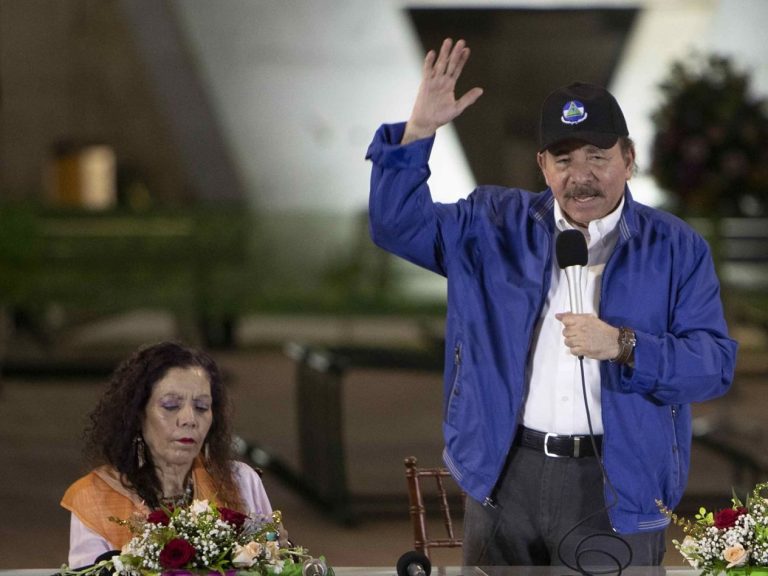3 de enero 2019

Children of Exile: The Births “Sowing Hope” in the Camp of Nicaraguan Farmers

PUBLICIDAD 1M
PUBLICIDAD 4D
PUBLICIDAD 5D
He gave a New Year message from his El Carmen bunker and ignored the GIEI report, the United States sanctions and the Nica Act.

They punish Rosario Murillo
In his last speech of the outgoing year, Nicaraguan dictator Daniel Ortega kept silent about the report of international human rights organizations, which point to his regime as responsible for the worst bloodbath in the country’s history in times of peace. Nor did he say a word about the approval of the Nica Act, which establishes harsh US political and economic sanctions against his regime.
With the excuse of offering a New Year message, Ortega left his room and stood in the conference hall of his residence/bunker, to deliver his last speech of 2018, backed by his wife Rosario Murillo, Fidel Moreno, Secretary General of Managua Mayor’s Office (sanctioned with the Magnistsky Law) and by Gustavo Porras, President of the National Assembly.
Ortega stressed that the road to peace is “reconciliation,” and that the people, despite the difficulties that lie ahead in 2019, will know how to “work to get ahead.” The dictator said that in 2019 the battle for justice and peace will continue, “convinced that this goal will be achieved.”
“This is a heroic and courageous people, that in spite of the difficulties knows how to work, to advance, to open roads where obstacles are present and it is the challenge we have for 2019, to continue opening the way so that in this new path we can advance with more speed and quickly towards our goals,” said Ortega.
The government repression against the civic protests dynamited a privileged relationship, revealing the fragility of the national economy, assured the economist Jose Luis Medal.
Surrounded by statistics that show the new failure of his economic management, Daniel Ortega proposed weeks ago to apply in the country a “gallo pinto” economy, appealing to the creativity and resistance of Nicaraguans to endure the hardships of an economic debacle caused by himself.
The problem is that this proposal is a fallacy, “a total absurdity, because taxes are not collected from rice and beans, which are tax-exempt. Taxes are collected from the sale of televisions, vehicles, and the formal sector of the economy.” Medal recalls.
Although it is true that “about 50% of the population already lives in the ‘gallo pinto’ economy, if vehicles are not sold—whose sale fully contracted this year—if the formal sector of the economy does not work, which is what generates fiscal revenues that allow the Government to function, how is the budget going to be covered?” He questioned.
“Remember that the Government has already adopted certain measures: it reduced the budget, which is contractive measure of the economy, and tax revenues have fallen. A “gallo pinto” economy does not generate fiscal revenues to maintain a state bureaucracy,” he emphasized.
During his last speech, Ortega indicated that “the challenges are huge, it is true, no one can deny it, but the people have showed that even in the biggest catastrophes, tragedies, they overcome them.”
The dictator insisted that Nicaragua has made progress despite the difficulties, and pointed out that it is a people of great faith, tenacity, laborious and creative. “These virtues, accompanied by the value of solidarity, become a powerhouse at moments like this, to resume or open new roads, new paths to peace, stability and the wellbeing of our families,” he stated.
Ortega got sentimental, and recalled that his government has inaugurated many public works despite the political and ideological differences. He spoke about the project of the road to Bluefields, adding that after it is finished, they will build a port so as not to depend entirely on those located in Costa Rica and Honduras.
“We will have our own port to export Nicaraguan products and import products from other regions, and to import the necessary inputs to develop economic activities in our country…and schools, health centers, roads, and paved streets could continue to be built,” said the dictator in a hopeful tone.
His New Year message ended with a kind of personality cult. All applauding, holding their hands and then singing the Ode to Joy.
PUBLICIDAD 3M
Periodista. Investiga temas de medio ambiente, corrupción y derechos humanos. Premio a la Excelencia Periodística Pedro Joaquín Chamorro, Premio de Innovación Periodística Connectas, y finalista del premio IPYS en el 2018.
PUBLICIDAD 3D